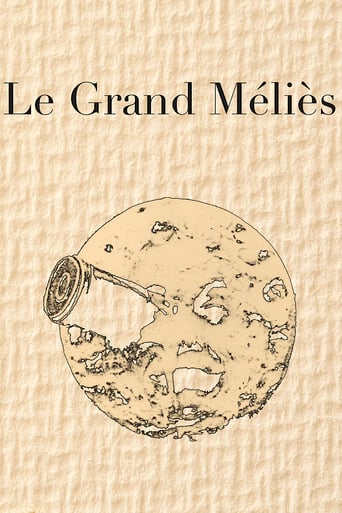gavin6942
A biography of the pioneer film director Georges Méliès, featuring his son André playing Georges, and with shots of his second wife, aged 90.Anyone unfamiliar with Georges Melies should look into his work. Other than perhaps Edison, few could be said to pioneer film in such a big way. Making countless short stories, he devised numerous trick shots and techniques that have been used for over a century since.Franju is an appropriate director to tackle the subject. Of course, all filmmakers owe a debt to Melies, but it seems appropriate that a Frenchman would make a nice tribute to the man's life and involve his family in the production.
Cineanalyst
This docudrama by Georges Franju isn't especially enlightening, interesting, or faithful to the career of Georges Méliès. It's, however, rather brief at about half an hour in length, and it may be a useful introduction to those unfamiliar with Méliès, who was one of early cinema's most influential and entertaining pioneers. Yet, even for an introduction, I recommend the biographical documentary "La Magie Méliès" (1997) instead. In "La Grand Méliès", Georges Méliès's son André plays his father, but unfortunately, he apparently can't act; he's lumbering, which seems entirely inappropriate to the exuberant performances his father gave in his own films. That André plays it mute and that much of the film plays out as a silent film with narration is also a mixed blessing: it seems faithful to silent films and the stage pantomime that influenced Méliès, but the filmmakers seem unsure of such territory, and the stiff performance by André is the result. Additionally, the film-making, in general, appears incongruous.Factually, the film's narrator incorrectly says the year 1896 for the first Lumière program. Méliès, in fact, attended their first cinema screening on 28 December 1895. I wonder, however, if this was a mistake in the English translation of the film, because it seems odd that a French filmmaker would mistake these dates. Yet, from there, the film implies that Méliès's first trick films employed his stage magic, rather than cinematic magic. A scene of a disappearance of a woman, by her climbing below the stage, is shown. Actually, Méliès's first films tended to be actuality films like those by the Lumière brothers, but almost from the beginning, such as with "The Vanishing Lady" (Escamotage d'une dame au théâtre Robert Houdin) (1896), Méliès was already stopping the camera and editing the film for disappearance and substitution effects.On the other hand, they're correct about the test exhibition for "A Trip to the Moon", which was to justify the film's high price to exhibitors. The film also provides a brief glimpse of Méliès's studio and the stage effects that were performed inside it for his films. Moreover, given the scholarship of 1952, one has to expect such a film to be factually lacking and potentially erroneous in parts. Additionally, clips are shown from Méliès's films "The Man with the Rubber Head" (L' Homme à la tête en caoutchouc) (1901), "A Trip to the Moon" (Le Voyage dans la lune) (1902), "The Music Lover" (Le Mélomane) (1903) and "The Merry Frolics of Satan" (Les Quatre cents farces du diable) (1906).Franju, along with the likes of Henri Langlois, was an early film preservationist, and this film of his in particular is said to have been important in reviving interest in Méliès among a contemporary generation of film scholars. Today, a new surge of appreciation for the pioneer cinema magician likewise seems to be on its way.
